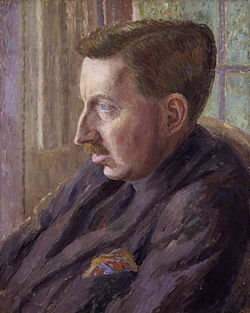E.M. Forster Quote
With the first jolt he was in daylight; they had left the gateways of King’s Cross, and were under blue sky. Tunnels followed, and after each the sky grew bluer, and from the embankment at Finsbury Park he had his first sight of the sun. It rolled along behind the eastern smokes — a wheel, whose fellow was the descending moon — and as yet it seemed the servant of the blue sky, not its lord. He dozed again. Over Tewin Water it was day. To the left fell the shadow of the embankment and its arches; to the right Leonard saw up into the Tewin Woods and towards the church, with its wild legend of immortality. Six forest trees — that is a fact — grow out of one of the graves in Tewin churchyard. The grave’s occupant — that is the legend — is an atheist, who declared that if God existed, six forest trees would grow out of her grave. These things in Hertfordshire; and farther afield lay the house of a hermit — Mrs. Wilcox had known him — who barred himself up, and wrote prophecies, and gave all he had to the poor. While, powdered in between, were the villas of business men, who saw life more steadily, though with the steadiness of the half-closed eye. Over all the sun was streaming, to all the birds were singing, to all the primroses were yellow, and the speedwell blue, and the country, however they interpreted her, was uttering her cry of now. She did not free Leonard yet, and the knife plunged deeper into his heart as the train drew up at Hilton. But remorse had become beautiful.
With the first jolt he was in daylight; they had left the gateways of King’s Cross, and were under blue sky. Tunnels followed, and after each the sky grew bluer, and from the embankment at Finsbury Park he had his first sight of the sun. It rolled along behind the eastern smokes — a wheel, whose fellow was the descending moon — and as yet it seemed the servant of the blue sky, not its lord. He dozed again. Over Tewin Water it was day. To the left fell the shadow of the embankment and its arches; to the right Leonard saw up into the Tewin Woods and towards the church, with its wild legend of immortality. Six forest trees — that is a fact — grow out of one of the graves in Tewin churchyard. The grave’s occupant — that is the legend — is an atheist, who declared that if God existed, six forest trees would grow out of her grave. These things in Hertfordshire; and farther afield lay the house of a hermit — Mrs. Wilcox had known him — who barred himself up, and wrote prophecies, and gave all he had to the poor. While, powdered in between, were the villas of business men, who saw life more steadily, though with the steadiness of the half-closed eye. Over all the sun was streaming, to all the birds were singing, to all the primroses were yellow, and the speedwell blue, and the country, however they interpreted her, was uttering her cry of now. She did not free Leonard yet, and the knife plunged deeper into his heart as the train drew up at Hilton. But remorse had become beautiful.
Related Quotes
About E.M. Forster
Considered one of the most successful of the Edwardian era English novelists, he was nominated for the Nobel Prize in Literature in 22 separate years. He declined a knighthood in 1949, though he received the Order of Merit upon his 90th birthday. Forster was made a Member of the Order of the Companions of Honour in 1953, and in 1961 he was one of the first five authors named as a Companion of Literature by the Royal Society of Literature.
After attending Tonbridge School, Forster studied history and classics at King's College, Cambridge, where he met fellow future writers such as Lytton Strachey and Leonard Woolf. He then travelled throughout Europe before publishing his first novel, Where Angels Fear to Tread, in 1905. The last of his novels to be published, Maurice, is a tale of homosexual love in early 20th-century England. While completed in 1914, the novel was not published until 1971, the year after his death.
Many of his novels were posthumously adapted for cinema, including Merchant Ivory Productions of A Room with a View (1985), Maurice (1987) and Howards End (1992), critically acclaimed period dramas which featured lavish sets and esteemed British actors, including Helena Bonham Carter, Daniel Day-Lewis, Hugh Grant, Anthony Hopkins and Emma Thompson. Director David Lean filmed another well-received adaptation, A Passage to India, in 1984.
